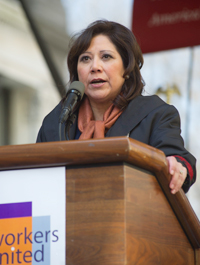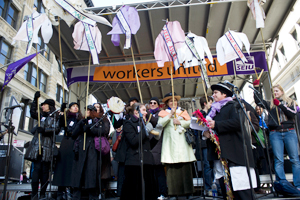One hundred years later, the Triangle Shirtwaist Factory fire is remembered
 On March 25, one hundred years after the Triangle Shirtwaist Factory fire claimed the lives of 146 workers and triggered the first real labor legislation in the United States, hundreds of people gathered on the corner of Washington Place and Greene Street to commemorate the tragedy. The day-long event, sponsored by Workers United and International Ladies’ Garment Workers Union, featured guest speakers such as Mayor Michael Bloomberg, the actor/activist Danny Glover, Senator Chuck Schumer, and U.S. Labor Secretary Hilda Solis.
On March 25, one hundred years after the Triangle Shirtwaist Factory fire claimed the lives of 146 workers and triggered the first real labor legislation in the United States, hundreds of people gathered on the corner of Washington Place and Greene Street to commemorate the tragedy. The day-long event, sponsored by Workers United and International Ladies’ Garment Workers Union, featured guest speakers such as Mayor Michael Bloomberg, the actor/activist Danny Glover, Senator Chuck Schumer, and U.S. Labor Secretary Hilda Solis.
The diverse crowd included students, professors, union members, and relatives of the victims, who held signs in the shape of shirtwaist blouses bearing the names of their loved ones. For the first time, every one of those names was read aloud. In her speech, Solis said the victims were “146 reminders that we could and should do better.” She then added, “They paid a very high price for the workplace protections we enjoy today.”
It was thanks to some NYU Law students and their professor that the death toll wasn’t higher that day. As the horrific fire, which had started in a waste basket, engulfed the top floors of the factory, there was almost no way to escape the flames--the manager had locked the exits to prevent the workers, mostly young immigrant Jewish and Italian women, from leaving work early. Firemen were unable to help; their ladders could only reach the sixth floor. In the building next door, Professor Frank Sommer and his students heard the cries and took action. They climbed to the roof and used ladders to span the gap between the buildings. The students "worked like beavers, apparently never giving a thought to the possibility that their own building might catch fire from the flames that were leaping out into the open space," Sommer told the New York Times that day. "How it was done, I don't know, but in surprisingly short time about fifty girls were brought across the ladders to safety."
 "The Triangle Fire inspired the first labor laws,” said Arieh Lebowitz, associate director of the Jewish Labor Committee, who attended the event. “Before the fire there were no sprinklers, no limit on maximum number of hours a person can work, no ban on over-night shifts, no age restrictions, and no fire drills, or fire exits. None of these mandates existed until after the tragedy.” The political influence of this tragedy is so far-reaching, the NYU Journal of Legislation and Public Policy is publishing a special issue to commemorating the centennial.
"The Triangle Fire inspired the first labor laws,” said Arieh Lebowitz, associate director of the Jewish Labor Committee, who attended the event. “Before the fire there were no sprinklers, no limit on maximum number of hours a person can work, no ban on over-night shifts, no age restrictions, and no fire drills, or fire exits. None of these mandates existed until after the tragedy.” The political influence of this tragedy is so far-reaching, the NYU Journal of Legislation and Public Policy is publishing a special issue to commemorating the centennial.
During the ceremony, the New York Fire Department paid homage to the dead, by hoisting a ladder to the sixth floor of the former factory where so many innocents perished. Glover, too, noted their contribution to history, asking: “Did they know when they leapt from the eighth floor window that they would ignite a movement?”

